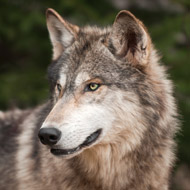Wildlife park celebrates conservation during 'Red November'

"The European wolf is globally of Least Concern but within the UK it is Extinct in the Wild"
Highland Wildlife Park, a 105-hectare safari park and zoo near Kingussie, Highland, Scotland, is celebrating the first 'Red November' with special presentations from keepers and free entry for drivers of red cars.
'Red November' is an awareness initiative developed by the British and Irish Associate of Zoos to celebrate the significant contribution of the International Union for the Conservation of Nature (IUCN) Red List in guiding conservation action and policy decisions over the past 50 years.
Talks by keeper's of various animals throughout the park will focus on their Red List classifications to inform visitors of the extent to which the animal is in danger of extinction. Categorisations vary from Least Concern to Extinct in the Wild, with Near Threatened, Vulnerable, Endangered and Critically Endangered in between. The presentations will also explain the treats to each animal's survival and inspire action and discussion towards biodiversity conservation.
Throughout the month the park will be giving away free entry to the drivers or red cars. There will also be an interesting fact-finding trail for children - with the chance to win a years' season pass.
Douglas Richardson, head of living collections at Highland Wildlife Park, said: “The animal collection at Highland Wildlife Park is developed under the guidance of the Red List. Our primary focus is on species classed as Vulnerable or worse. For some of our species, particularly those currently or historically native to Scotland, we have refined their Red List categorisation to determine their status within a local context; for example, the European wolf is globally of Least Concern but within the UK it is Extinct in the Wild. Combining these classifications, over 55% of the species at the Highland Wildlife Park are in a high threat category, whereas in most zoos they would only represent about 25% of the collection.
“The List isn’t exclusively doom and gloom; it has had a positive impact in regenerating the wild populations of threatened species. At the Park we manage a herd of European bison of which Glen Rosa, a female born here in 2012, was moved to Romania to be reintroduced into the wild and contribute in upgrading the species from Extinct in the Wild to Vulnerable.”
Daska Macintosh, head of operations and visitor services at Highland Wildlife Park, said: “We hope the exciting activities organised throughout Red November will not only enhance our visitors’ experience, but inspire them to discover and understand more about the threats faced by many of our species and what can be done to help. At various points throughout the Park, visitors will be able to directly contribute towards the Royal Zoological Society of Scotland’s conservation work of local Critically Endangered animal, the Scottish wildcat.”



 The Veterinary Medicines Directorate (VMD) is inviting applications from veterinary students to attend a one-week extramural studies (EMS) placement in July 2026.
The Veterinary Medicines Directorate (VMD) is inviting applications from veterinary students to attend a one-week extramural studies (EMS) placement in July 2026.